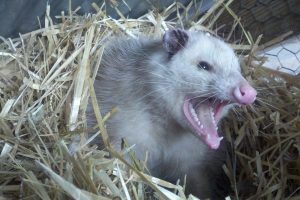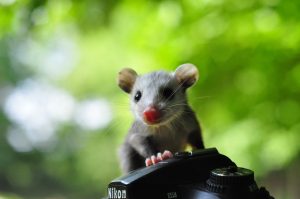This November, we’re celebrating Wildlife Wednesdays with unique stories of gratitude for the animal kingdom. From pollination to pest management, follow along with this month-long blog series each Wednesday to learn why we have much to thank the wild, wacky world of wildlife for. In the previous blog, we explored the connection between turkey vultures and climate change, and why we should show gratitude for these underappreciated heroes. Be sure to check it out here.
Marsupial Mothers

The unsung hero of today’s story of gratitude is the Virginia opossum (Didelphis virginiana). This unique mammal is the only species of marsupial found in North America. Marsupials are a group of mammals with a gestational period that is shorter than that of placental mammals like us! Because marsupial mammals’ young spend less time developing in their mothers’ wombs, when they are born, they are underdeveloped and must make their way into their mother’s pouch to continue developing. Born after just 13 short days, baby opossums will then spend approximately 80 days in their mother’s pouch, nursing and growing stronger. After emerging, they will continue to stay close to their mother, hitching a ride on her back until they are ready to go off into the world on their own.
All About the Opossum
In Florida, opossums are found in a variety of habitats, but prefer thick, wooded areas close to a body of water. These unique mammals are nocturnal, opportunistic omnivores, which means that they are most active at night, can eat both plant matter and meat like us, and that they will consume a wide variety of foods that are easily accessible to them. Opossums have around 50 teeth- more than any other land-dwelling mammal in North America! When threatened, opossums may open their mouth wide to show off their many teeth as a warning for other animals to stay away.

Opossums are equipped with a tail and feet that are prehensile, which means that they are able to manipulate and grasp things with those appendages. This is similar to our own prehensile hands with opposable thumbs that have given us the ability to create and utilize a variety of tools. While opossums often use these tails to aid them in climbing trees, they are ground dwelling, and will mostly sleep in dark, safe dens in tree hollows, caves, and burrows.
The Details are in the Diet
As the only marsupial mammals in the United States, opossums are pretty interesting animals. But why should we be grateful for their presence?
Opossums play important roles in their local habitats. They help maintain clean and balanced forest ecosystems by consuming a variety of other insects, scavenging for dead animals, and serving as prey animals for other predators. Opossums are additionally able to consume a variety of snake species- even venomous ones, as they are resistant to the venom from species like cottonmouths and rattlesnakes (Fitzwilliam & Boughton, 2020). And, for the cherry on top, opossums are less likely to carry rabies (Fitzwilliam & Boughton, 2020)!
How You Can Show Your Appreciation for Opossums

These interesting and at times off-putting mammals are often the victims of road strikes. Because they may also “play dead” when threatened, and like many other nocturnal animals, may be confused or stunned by the sudden flash of bright lights, they often do not make it out of the way before it’s too late. Help protect opossums from road strikes by driving slowly and cautiously at night, especially through wooded areas.
Learn More About Opossums
If you would like to learn more about this interesting animal, the following resources may be helpful:
UF/IFAS Extension Wildlife of Florida Factsheet: Virginia Opossum
Florida Fish and Wildlife Conservation Commission (FWC) Guide to Living With Opossums
What should you do if you find a baby opossum?
See you next week for another story of gratitude!
Find more blogs in the Stories of Gratitude for the World of Wildlife series.
Resources
Fitzwilliam, S. & Boughton, R. K. (2020). Wildlife of Florida Factsheet: Virginia Opossum. EDIS. doi.org/10.32473/edis-uw471-2020
Source: UF/IFAS Pest Alert
Note: All images and contents are the property of UF/IFAS.



